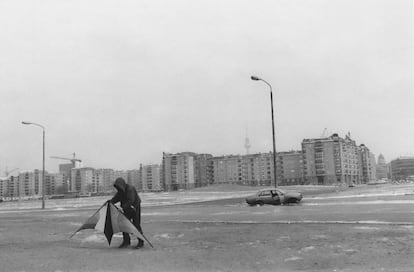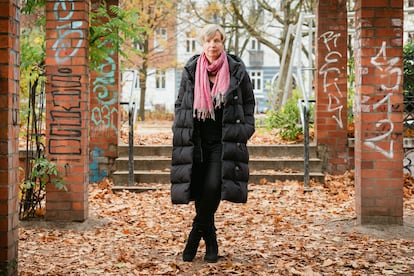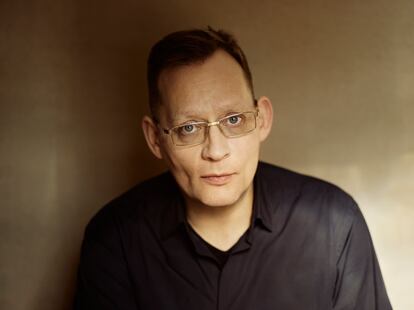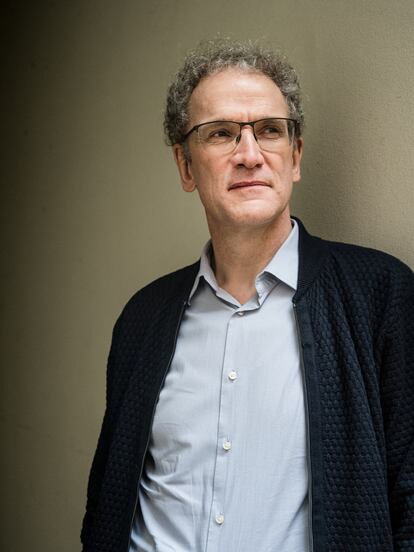Germany, chronicles of an imaginary nation
Thirty-five years after the fall of the German Democratic Republic, a ‘mental wall’ continues to divide the country, including in its literature. EL PAÍS took a trip through Berlin, Jena and Leipzig in search of the great German novel, written today by authors like Jenny Erpenbeck and Clemens Meyer

Jenny Erpenbeck spent the night the Berlin Wall fell, November 9, 1989, in the manner of Fabrice del Dongo, the protagonist of The Charterhouse of Parma who found himself amid the chaos of the Battle of Waterloo, yet was completely unaware that it was taking place around him. Erpenbeck had met up with some friends that night and slept at one of their homes, where there was no television or telephone. She didn’t hear about what had happened until the next morning on the radio. A definitional moment of humanity took place just a few blocks away, and she missed it.
Thirty-five years later, Erpenbeck is perhaps Germany’s most critically and popularly recognized writer, who has achieved considerable international success (possibly even greater than her renown within her own country) and who has a solid chance of someday winning the Nobel Prize. That definitional moment of humanity — Europe’s last truly optimistic glimmer, the triumph of liberty over dictatorship — changed her life, as it did those of millions of East Germans. Possibly, it was what made writers of her generation and other figures from the country’s current literary landscape, who continue to mull over that night and the changes that were to follow, the hope and the disappointment. To a certain extent, the event’s shadow hangs over all of Erpenbeck’s work, but nowhere so much as in her last book, Kairos, the winner of the prestigious Booker International Prize in 2024.
“In the beginning, there was euphoria. We were free and we could shop and travel,” says Erpenbeck on a chilly fall morning in the apartment where she lives with her husband, an Austrian conductor, in Prenzlauer Berg, the most intellectual and bohemian of the old East Berlin neighborhoods. But in addition to being a liberation, at least as she remembers it, the fall of the Wall was something else. The end of the German Democratic Republic and its absorption by the Federal Republic of Germany represented loss: the loss of a country, one that ceased to exist. “Without going into the question of socialism or no socialism, we experienced it as the collapse of our state, or of a state.”

And this story — that of euphoria and loss, of a country that disappeared and is today nearly imaginary, of a new country that was theirs, almost — explains many of the problems and some of the neuroses of today’s Germany. It is the story of the persistent division between East and West, the famous “mental wall” and continuing economic and social inequalities, in addition to the strength of populism in former GDR territories. It is a story that sometimes fiction explains better than anything else, through the work of authors like Ingo Schulze and Uwe Tellkamp, and phenomena like Erpenbeck herself and Clemens Meyer, the brilliant author of Die Projektoren (The Projectors), which Der Spiegel included on its list of the 100 best novels of the last century and considers a classic, despite the book having been published quite recently.
Where does this strength come from, this style, these themes that have for some critics made these books the most fascinating to be produced by German authors? And why has the literature of the East become a battleground for the most acrimonious debates about what 1989 was, and what it means today?
It is Friday night in Jena, home to poets and thinkers, the city of Goethe and Schiller which, like Waterloo, was the site of a Napoleonic battle. Today, it is an anodyne urban center like so many others in Europe, with commercial streets, every so often a kebab shop, with little to do after 7 p.m. — except, perhaps, pay around $8 to listen to a writer speak in a library.
“This book is an event,” proclaims the veteran literature professor who introduces Meyer and The Projectors to the audience of around 90 people. “It is the novel of the century.”
A few days prior, Meyer provoked a scandal of the sort that enlivens the monotonous German literary scene. It happened at the Frankfurt presentation of the Deutscher Buchpreis, the country’s most prestigious literary prize. The Projectors, a thousand-page novel on which Meyer worked for more than a decade and which covers a swath of German and European history in the 20th and 21st centuries, was a finalist, but the jury ultimately chose Hey guten Morgen, wie geht es dir? (Hey, good morning, how are you?) by Martina Hefter.
Upon leaving the ceremony, Meyer exclaimed: “Fucking bastards!” Even the tabloid Bild reported on this remark. In Der Spiegel, the author clarified why he was so angry. The prize tends to boost book sales, and he thinks the money would have been helpful in covering the costs of his divorce and paying off the nearly $36,800 he owes to tax authorities. He threw another dart at the prize’s jury, saying, “Nowadays, great literature is no longer valued. A book like mine, which covers the whole world and is a shot of fabulation in the tradition of Alfred Döblin and Günter Grass… "

Meyer lacks not for modesty. He rose to fame in 2006 with Als wir träumten (While We Were Dreaming), a novel about 1980s and 1990s Leipzig. “There’s this nursery rhyme I know,” reads its memorable opening lines. “Sometimes I mouth it silently, sometimes I just start humming it and don’t even notice because the memories are dancing in my head, no, not just any memories, the ones of the time after the Wall fell, the years we — made contact?”
Nor is he in need of ambition, the will to measure oneself against the greats. Tellkamp, author of The Tower, another monumental novel that takes place against the backdrop of the bourgeoisie of late Communist Dresden in the 1980s, spares Meyer’s latest no praise in an email to El PAÍS. “The Projectors is comparable to The Tin Drum by Günter Grass and Anniversaries by Uwe Johnson or, for readers, to Tu rostro mañana (Your face tomorrow) by Javier Marías or Robert Bolaño.”
At the reading in Jena and in conversations from that same day — at a café in the afternoon and over evening drinks in a biergarten — Meyer talks about Bolaño and bullfighting; of the GDR authors who shaped him, like Christa Wolf, Brigitte Reimann and Wolfgang Hilbig; and of his memories of the fall of the Wall. He was 12 years old, living in Leipzig, and his parents had previously taken him to some protests that, especially in the city itself, helped to hasten the end of the regime. Meyer already had literary aspirations. “It was a crazy time,” he says.
“The 1990s were very important for me. We could see behind us, see what the GDR had been, and also see what we had in front of us. I took advantage of that freedom to read all the literature that I couldn’t read before 1989. The Tin Drum wasn’t published in the East,” he says. “A part of me will always be an East German writer, but just a part.”
A writer from the West would not have been able to write While We Were Dreaming, so linked to Meyer’s experiences in Leipzig during his adolescence. It’s also difficult to think of someone from Stuttgart, Hamburg or Düsseldorf thinking up The Projectors, a tale that spans from World War II to the Balkan wars of the 1990s, referencing Western films made of the popular novels by Germany’s Karl May, which found much success in the GDR.
“I had the idea in 2008 on a trip to Croatia,” says Meyer. “A writer and war journalist, Edo Popovic, brought me to locations where they filmed those strange Western German films in the 1960s about Karl May. I recognized the places immediately, because as a child, I was a total fan of those movies. The writer explained to me that in that same spot where they filmed the movies, 30 years later, the first conflicts between the Serbs and Croats broke out. That’s when I thought: ‘This is powerful material. I have to do something. One could make a great novel with this about war and the madness of history.’ In 1941, the Germans destroyed Yugoslavia. In 1962, they went back to film movies. And 30 years later, Yugoslavia falls and there’s a civil war.”
If there is something particularly East German about Meyer, it could be his vision, at once marginal, grandiose and panoramic in time and space: “I deal with the great utopias of the 20th century. Why socialism failed and why it couldn’t get rid of Stalin. Tito did it, but it didn’t work there either. I see myself as someone to whom history came very close, in Leipzig in 1989. History happened there, and that is something quite unique.”
In a Leipzig café located in front of the Nikolaikirche, the church at which Bach was music director — on this morning, the organist is performing Prokofiev’s Peter and the Wolf — and nucleus of the 1989 peaceful revolution, Germanist Dirk Oschmann reminisces about those very days. He too was touched by history. Oschmann was a student immersed at the time in Thomas Mann’s Doktor Faustus. His attention was split between the wanderings of musician Adrian Leverkühn and the TV news. “A German book,” he sums up, “a book dealing with German philosophy, German misery, the long German history from Luther to Hitler and the role of the Romantics and Protestantism and art. All these issues were present, indirectly, in 1989. And I, of course, asked myself, ‘What do I know now?’” He went to Berlin by train with his girlfriend to experience history up close. He took the 100 German marks that the FRG gave out to East Germans and spent them on Suhrkamp paperbacks, many of which were unobtainable in the GDR. “It became clear to me that everything was going to change radically,” he says, “and also, for me.”
Oschmann, who is now a professor of modern German literature in Leipzig, published Der Osten: eine westdeutsche Erfindung (The East: A West German Invention). It is an essay on East German identity and how, almost four decades after the fall of the Wall, it is still shrouded in negative connotations and defined as a “deviation” from the norm, which is the “West German” identity.

On one hand, the literature of the East possesses what Oschmann calls “a unique narrative capital” — life under the dictatorship, the revolution of 1989, the hard reconversion of the 1990s — raw material that Western authors lack, their petty bourgeoisie lives so lacking in revolution, tragedy and heroic acts. On the other hand, the essayist decries how this literature has been locked up in a ghetto erected by the West that is meant to degrade it. He speaks of how authors like Christa Wolf, who had obtained lofty recognition in West Germany before 1989, were suddenly labelled as “sentimental and moralizing kitsch,” a literature that accommodated the Communist regime. The revelation of some of these writers’ links with the Stasi, the sinister East German secret police, put the final nail in the coffin of their reputations.
“The concept of GDR literature became damaged, like something from the past,” says Oschmann. “And it continues to damage the literature of authors who come from the East.”
Back in Berlin, the conversation continues in the book-strewn office of Erpenbeck, who is herself an author of a novel about the end of the GDR and the beginning of uncertain times in united Germany. Her book Kairos chronicles the disintegration of a country through the breakdown of the relationship between Hans, an intellectual sympathetic to the regime, and Katharina, a student. “Everything is falling apart,” Erpenbeck writes. She tells of how, during the Nazi years, many German writers, from Bertolt Brecht to Thomas Mann, left their homes. Later, the opposite took place: their homes abandoned them without them having gone anywhere at all.
When Oschmann lamented how the concept of GDR literature continues to be wielded against contemporary authors, it was a reference to historian Ilko-Sascha Kowalczuc’s criticism of Erpenbeck. In Friheitsschock (The Shock of Freedom), Kowalczuc, who, like Erpenbeck, grew up in East Berlin, recalls the Kairos author’s familial roots, and seems to reproach her for them. Erpenbeck’s grandparents, Fritz Erpenbeck and Hedda Zinner, belonged to the circle of German Communists who were exiled to the USSR during World War II. After the war, they emerged as East Germany’s intellectual elite. Kowalczuc argues that this colors their granddaughter’s gentler view of their vanished country. “For her, 1989 was not a celebration of freedom,” Kowalczuc writes.
“When you critique, you should read my other books,” Erpenbeck offers in response. During our conversation, she pulls from her shelf a copy of Selbstbegragung (Self-Examination), the book that her grandmother Hedda Zinner published in 1989, a critical view of her years in Stalinist Russia. Her grandparents’ life was more complex, she says, than the image Kowalczuc paints of them as “Communist fanatics.” And in any case, she says, “One would have to admit that I am two generations removed from them.”
Kairos touches a nerve, an intimate place in the identity of modern Germany, because it concerns the meaning of 1989. Liberation, yes, and democracy and prosperity and welfare in one of the most prosperous countries on the planet. But also, frustration, trauma.
Erpenbeck removes more books from the shelves. Books about the Soviet years, Fritz and Hedda’s 1930s. Volumes with photographs from the 1990s in which drunkenness mingled with the vertigo of the unknown. Photographs like the one by Sibylle Bergemann that illustrates this article and that is currently being exhibited at the C/O Berlin gallery. It shows Potsdamer Platz in 1990, a person holding a kite that may or may not take to the air, the no man’s land between East and West, the iconic broadcasting tower. An instant, an era.
In one of the texts included in her book of essays Kein Roman (Not a Novel), Erpenbeck writes of how, despite of all the comforts she enjoys today, a trace of sadness remains that financial gain cannot erase. Can you imagine, she asks, how even in a country that is forever referred to as a rogue regime, one might have a happy childhood?
She likes to think that this is possible, that it’s possible for a country to exist that has now vanished, is nearly imaginary today, where it was once possible to be content even if it all turned out to be a failure. She likes to believe that there is another model aside from “radical consumerism, radical individualism, radical egoism.” What is it? “I certainly do not mourn the disappearance of the GDR as it was, and I don’t think anyone does,” she says in her Prenzlauer Berg flat. “But — how can I say this? I believe that the grief is over the possibility of something different, of alternatives.”
Sign up for our weekly newsletter to get more English-language news coverage from EL PAÍS USA Edition
Tu suscripción se está usando en otro dispositivo
¿Quieres añadir otro usuario a tu suscripción?
Si continúas leyendo en este dispositivo, no se podrá leer en el otro.
FlechaTu suscripción se está usando en otro dispositivo y solo puedes acceder a EL PAÍS desde un dispositivo a la vez.
Si quieres compartir tu cuenta, cambia tu suscripción a la modalidad Premium, así podrás añadir otro usuario. Cada uno accederá con su propia cuenta de email, lo que os permitirá personalizar vuestra experiencia en EL PAÍS.
¿Tienes una suscripción de empresa? Accede aquí para contratar más cuentas.
En el caso de no saber quién está usando tu cuenta, te recomendamos cambiar tu contraseña aquí.
Si decides continuar compartiendo tu cuenta, este mensaje se mostrará en tu dispositivo y en el de la otra persona que está usando tu cuenta de forma indefinida, afectando a tu experiencia de lectura. Puedes consultar aquí los términos y condiciones de la suscripción digital.









































